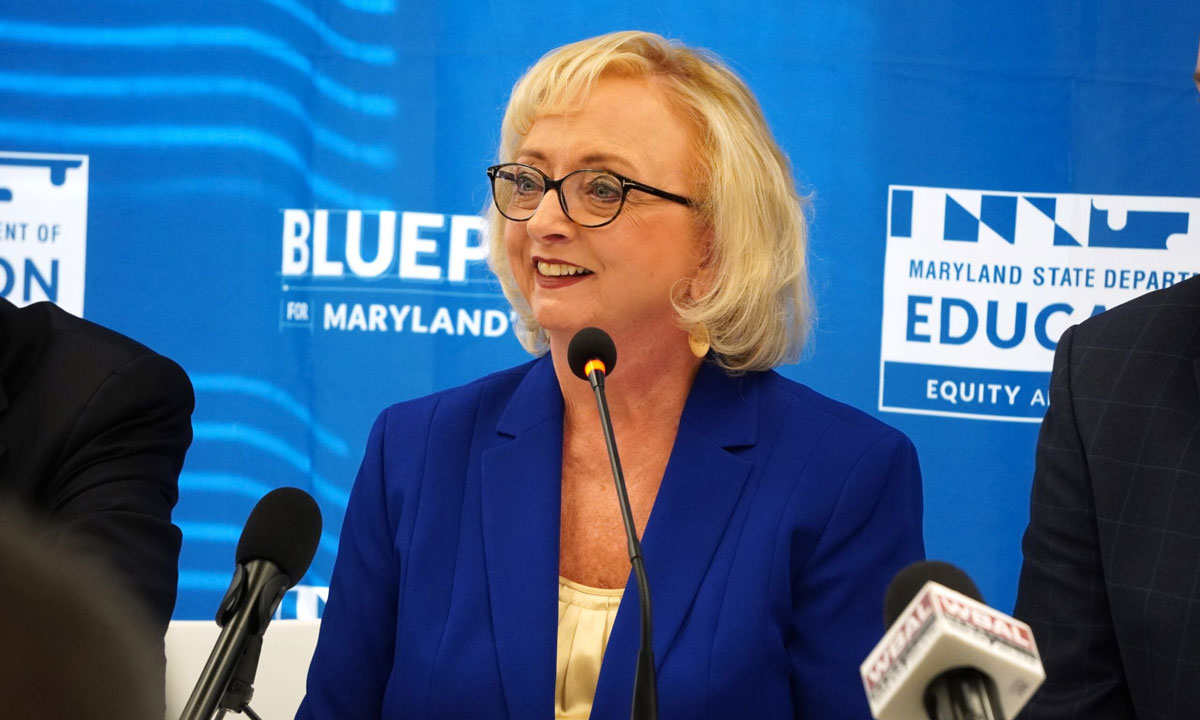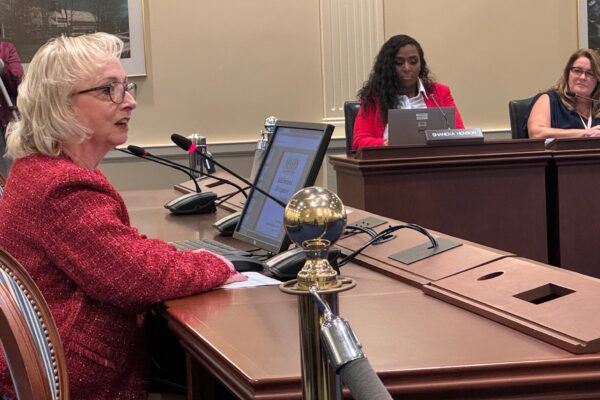Maryland BOE Picks Carey Wright as Permanent Public Schools Superintendent
Wright began as interim superintendent Oct. 23, replacing Mohammed Choudhury.

Get stories like this delivered straight to your inbox. Sign up for The 74 Newsletter
She’s staying put.
The interim title will be removed from Carey Wright’s name after the Maryland Board of Education’s unanimous vote Wednesday to make her the permanent state superintendent of public schools.
Wright began as interim superintendent Oct. 23, replacing Mohammed Choudhury, who resigned days prior to become senior adviser for the state school board with a base salary of $310,000 until his contract expires June 30.
Wright, a Maryland native who received a $350,000 salary that was prorated for the remainder of her term until June 30, led several initiatives during her half-year leading the state school system of nearly 890,000 students.
She will begin her term as the state’s permanent leader July 1 until June 30, 2028, at an annual salary of $360,500.
Wright, who began in the education profession as a teacher in the Prince George’s County public schools in September 1972, thanked the board and said one of her goals is to listen to all stakeholders to improve public education.
“We want all of our children to be as successful as they can possibly be and it’s our job to support them to get there,” she said. “I am committed and determined to make Maryland the education destination.”
In December, the state school board retained Hazard, Young, Attea & Associates (HYA) of Illinois to help conduct a nationwide search. The firm that has conducted searches for various school systems in Maryland worked alongside the school board’s search committee to help recruit and vet qualified candidates.
At the end of the application deadline on March 1, nearly 40 people expressed interest with 26 “fully completing” applications.
The board announced a special meeting April 13, but went into an executive session. On that day, the board interviewed semi-finalists and narrowed it down to the final candidates.
On Wednesday, the board voted to retain Wright.
“We looked all across the country and you came to us as one of the top national leaders and our thorough search found that,” said board Vice President Joshua Michael, who chaired the board’s search committee. “You have both the experience and knowledge of being a Marylander and of Maryland schools and the disposition, experience and skill set to lead the reform and the improvement in public schools.”
Wright began working on statewide priorities such as incorporating the science of reading in all 24 school systems starting in the 2024-25 school year. The program, which Wright led during her tenure as state schools chief in Mississippi, focuses on teaching students based on phonics instructions sound, comprehension and vocabulary.
Wright testified this year in Annapolis, urging lawmakers to fully fund public education and to continue to support the Blueprint for Maryland’s Future education reform.

The 10-year, multi-billion-dollar Blueprint plan is overseen by the Accountability and Implementation Board (AIB), which Wright supports.
However, the Blueprint mandates continue to vex local school officials, who have outlined in Blueprint documents their challenges in hiring new teachers amid a shortage in the profession, expanding prekindergarten to include 3- and 4-year-old children and incorporating college and career readiness programs into the curriculum.
Wright is leading other education initiatives such as sending literacy expert teams to visit schools and the release of a statewide literacy plan later this year. In addition, she is creating strategies to boost math test scores and has established a joint committee with representatives from the state Higher Education Commission and University System of Maryland to assess educator programs.
The state Department of Education released a leadership profile report in January to highlight agency strengths and challenges, which was based on 564 interviews and surveys with various state, regional and local agencies and organizations, parents and students.
Some of the strengths, according to the report, include the push for education reform, continued support of the Blueprint and collaboration between the state board, department officials and staff and other stakeholders.
The challenges include ensuring equitable experiences for all students, the challenges of the state superintendent working in collaboration with both the state board and the AIB, and state officials trying to encourage Blueprint “buy in” with some local school officials.
One challenge mentioned several times is how to improve relationships between the department, local school systems and the community.
“Transparency between the State Superintendent and all stakeholder groups was mentioned in interviews and focus groups as a significant challenge that developed under the previous administration,” according to the report. “While there has been positive momentum in recent months, the challenge to continue to provide transparent communications in order to rebuild trust with stakeholder groups is something on which the new superintendent will need to focus.”
When Wright arrived last fall, she was praised for work in Mississippi and for being a native Marylander. She received her bachelor’s, master’s and doctoral degrees at the University of Maryland, College Park.
“Dr. Carey Wright’s distinguished career as an educator, administrator, and leader in public education has uniquely prepared her to meet this moment as Maryland’s State Superintendent,” Gov. Wes Moore (D) said in a statement. “She is a champion for students, and I’m confident that she is the leader we need to fulfill the promise of creating a world-class public education system for Maryland.”
Cheryl Bost, president of the Maryland State Education Association, said in a statement she’s appreciated the working relationship with Wright during her tenure as interim superintendent.
“As superintendent, we hope that she will prioritize ensuring that educator voices are at the table in helping to make decisions that impact our schools, students, and critical issues like ending the educator shortage and implementing the Blueprint for Maryland’s Future,” Bost said.
This story was originally published in Maryland Matters.
Get stories like these delivered straight to your inbox. Sign up for The 74 Newsletter

;)